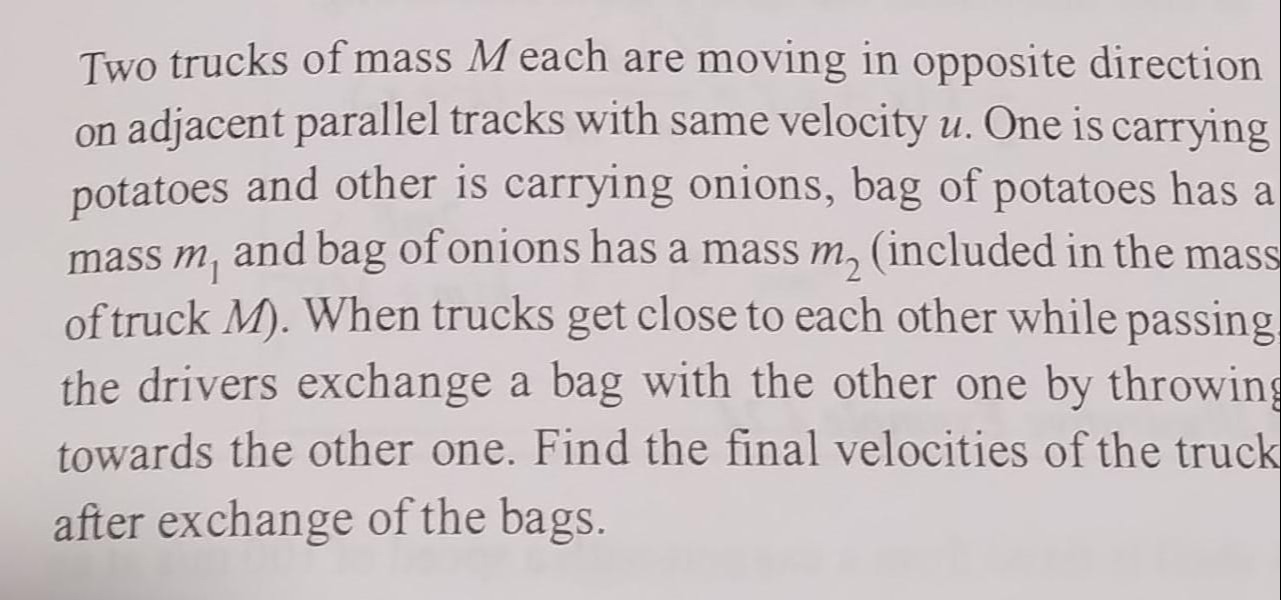Question
Question: Two trucks of mass $M$ each are moving in opposite direction on adjacent parallel tracks with same v...
Two trucks of mass M each are moving in opposite direction on adjacent parallel tracks with same velocity u. One is carrying potatoes and other is carrying onions, bag of potatoes has a mass m1 and bag of onions has a mass m2 (included in the mass of truck M). When trucks get close to each other while passing the drivers exchange a bag with the other one by throwing towards the other one. Find the final velocities of the truck after exchange of the bags.

The final velocities of both trucks are 0 m/s.
The final velocity of the truck carrying potatoes is u and the truck carrying onions is −u.
The final velocity of the truck carrying potatoes is −u and the truck carrying onions is u.
The final velocities depend on the masses m1 and m2 and cannot be determined without further information.
The final velocities of both trucks are 0 m/s.
Solution
The problem can be solved using the principle of conservation of linear momentum.
1. Initial State: Let's assume the initial direction of the truck carrying potatoes is the positive direction.
- Truck 1 (carrying potatoes): Mass M, initial velocity v1i=+u.
- Truck 2 (carrying onions): Mass M, initial velocity v2i=−u.
The total initial momentum of the system (two trucks and their loads) is: Pi=Mv1i+Mv2i Pi=M(u)+M(−u)=Mu−Mu=0
2. Final State: After the exchange of bags:
- Truck 1 (now carrying onions) has a mass of (M−m1)+m2. Let its final velocity be v1f.
- Truck 2 (now carrying potatoes) has a mass of (M−m2)+m1. Let its final velocity be v2f.
The total final momentum of the system is: Pf=((M−m1)+m2)v1f+((M−m2)+m1)v2f Pf=(M−m1+m2)v1f+(M−m2+m1)v2f
3. Conservation of Momentum: Since there are no external horizontal forces acting on the system during the exchange, the total linear momentum is conserved: Pi=Pf 0=(M−m1+m2)v1f+(M−m2+m1)v2f
This equation has two unknowns (v1f and v2f). However, the problem implies a symmetric exchange. In such problems, especially when the initial objects are identical and moving with equal and opposite velocities, a common implicit assumption that leads to a solvable unique answer is that the final velocities of the primary objects (the trucks) are equal.
Let's assume v1f=v2f=vf. Substituting this into the conservation of momentum equation: 0=(M−m1+m2)vf+(M−m2+m1)vf 0=[(M−m1+m2)+(M−m2+m1)]vf 0=[M−m1+m2+M−m2+m1]vf 0=[2M]vf
For this equation to hold true, vf must be 0. Therefore, v1f=0 and v2f=0.
The final velocities of both trucks are 0 m/s.
